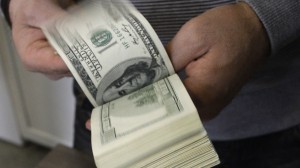Some research helps quantify phenomena that we already understand intuitively. Most people would agree that donating to political campaigns buys you access that other constituents lack, and this week two graduate students studying political science — Joshua Kalla at Yale and David Broockman at UC Berkeley — released a study that shows it to be true.
The researchers enlisted CREDO Action, a progressive advocacy group, to help with their experiment. They took a real bill — the authors don’t say what the legislation was – and they randomly sent one of two form letters asking for a meeting to discuss the legislation to 191 House members who had not yet taken a position on it.
One email featured the subject line, “Meeting with local campaign donors about cosponsoring bill,” and said that the group would consist of “active donors.” The other just said that a group of “local constituents” wanted to discuss the bill. The emails specified that if the lawmaker was unable to personally attend the meeting, the group would like to meet with the most senior staffer available.
And the results were exactly what one might expect: 2.4 percent of the letters from constituents won a meeting with a legislator or his or her chief of staff, compared with 12.5 percent of the letters from “active donors.” In other words, those with potential donations were five times as likely to get a meeting with someone at the top. And just under 19 percent of the donors were able to meet with the next-highest staffer, compared with under six percent of ordinary constituents.
Broockman told The Washington Post’s Mattea Gold that “he was surprised by the size of the difference, and noted that the study may actually underestimate the access of political donors, since none of the offices were told ahead of time the identities of the contributors, how much they had given – or even whether they had donated to that member of Congress.”
“That was a really key piece,” Broockman said. “It gets very far away from the quid pro quos that the court suggested are the only ways influence operates.”
The study, currently under consideration for publication, drew praise from Donald P. Green, a professor of political science at Columbia University and expert in the use of field experimentation to study politics, who reviewed the results and said they showed a small but clear pattern.
“It’s convincing, but not overwhelming,” said Green, adding that he is eager to see others attempt to replicate the study in other arenas.
Read more at The Washington Post or check out the study.



